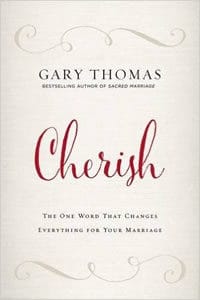Preview:
Gary Thomas: When you get married, your first call, your first look has to be toward your spouse. And, and I would say that particularly to younger couples. That’s what has to change in marriage. When you get good news or bad news, if your first call is to your parents, if your first call is to your best friend, you’re not fully married yet. That first call, that first look has to be toward your spouse if they’re gonna feel cherished.
End of Preview
John Fuller: That’s Gary Thomas talking about an important word that can transform your marriage, cherish. Gary was with us last time, and we’re looking forward to hearing more from him today on Focus on the Family. Your host is Focus president and author, Jim Daly. And I’m John Fuller.
Jim Daly: A common problem for married couples is falling into a routine or a rut, uh, with one another. It’s not like you stop loving your spouse, but maybe you’ve grown apart or you don’t have that emotional connection you once did. And this may be a common occurrence, but that doesn’t mean it’s a good thing or a healthy thing for your marriage. And last time, Gary was challenging us to think differently about our spouse and raise the bar on that relationship. Uh, he shared some good examples and some bad examples of how couples have cherished one another. And today, we’re gonna dig into more practical ways you can put the word cherish into action in your marriage.
John: Gary Thomas has written a terrific book on this topic. It’s called Cherish: The One Word That Changes Everything For Your Marriage. Learn about the resource and our guest at focusonthefamily.com/broadcast or call for details. Our number is 800, the letter A, and the word FAMILY. And now here’s part two of our conversation with Gary Thomas on Focus on the Family.
Jim: Um, one of the major things you address is how well we respond when our spouse is talking to us. And I imagine, uh, this is a common problem (laughs) in marriage. Husbands and wives, uh, they get busier. They get distracted. Uh, maybe we’re staring at our cell phones or television or whatever it is right in front of us and we’re not paying attention to each other the way we should be. Um, we’re not trying to be rude, I’m sure. But, uh, maybe the point of the conversation doesn’t seem that significant to us. Husbands are probably guilty of that, but you say our response becomes critical over time. Why is that?
Gary: Yeah. The analogy I like to use for guys is that marriage is like baseball. You’re the batter at the plate, and your wife is throwing pitches every day. And once a pitcher throws the ball, the pitch counts. Right? You can let it go by and maybe it’s a called strike, maybe it’s a ball. You can foul it off, you can hit it, but it’s gonna go in the record something happened. And every time our wife says something to us, it’s like she’s throwing a pitch. And our batting average is going to be affected. And the best marriages, and this is what’s (laughs) so hard for husbands, right, because if you hit 350 in the Major Leagues-
Jim: That sounds pretty good.
Gary: You, you’re pretty good.
Jim: (laughs)
Gary: If you hit 350 in marriage, it leads to disastrous consequences.
Jim: What do you got … What does your batting average have to be to-
Gary: Well, the best marriages, they call them marriage masters, is about 90%. And that means nine out 10 times.
Jim: So battin’ 900 (laughs).
Gary: And it’s very practical. And it’s helped me … You know, just being a guy that … Well, okay, here’s how, how I can kind of keep count, but it’s basically if your wife says, “Honey, there’s this article that I just read.” And so often something that interests her might not interest me. But here’s what another husband said that helps me so much. He realized he was working on a $200,000 bid that was due the next day. He’s self-employed. And this is a, a big thing. And his wife had little down time. She works beside him. She was on Facebook and found something that seemed so fascinating about some semi distant friend that frankly-
Jim: (laughs)
Gary: … he couldn’t care anything about.
Jim: Not the moment.
Gary: But here’s what I love his approach, here’s why his wife feels cherished. He goes, “I realize that when Jacqueline is talking to me, it’s not what she’s talking about, it’s who’s talking. And if I wanna cherish Jacqueline, I have to notice.” And he was taught when he was young, you notice somebody by looking at them. That’s how they know-
Jim: Right, right.
Gary: … you’re listening to them. And so he forces himself to look at Jacqueline when he’s talking. Because he said, “I might not care what she’s saying, but I care about her. I care more about that $200,000 bid than this semi friend from Facebook. But you know what? I care more about my wife than that $200,000 contract, and so I need to catch this bid.”
Jim: Ah. When you talk about that idea of bid, um, what do you mean by it as a couple? Bidding for each other’s attention, or what do you mean by bid?
Gary: If you see something in the newspaper and point it out or the husband says, “Honey, look at that bird. It’s incredible,” even if she’s not into birds. Or if the husband is just into something and shares something that matters to him, that’s a bid.
Jim: Yeah.
Gary: You’re throwing it out. Well, what, whenever a spouse is saying something, here’s what they’re really asking, “Do you still cherish me? Are you still interested in me?” That’s what made dating so intoxicating is because somebody was curious, and they asked us for more. Cherishing is about maintaining that curiosity and asking for more. Now, some are gonna come back and say, “How can I be curious about somebody I’ve been married to for 30 years?”
Jim: Ah.
Gary: And this is the thing, you’re not married to the same person. I’ve been married to my wife for 31 years now. But here’s the thing, having children changes a woman. Becoming an empty nester changes a woman. A woman losing one or both parents changes a woman. A woman who succeeds in her occupation or fails in her occupation, a woman who goes through cancer … We change all the time because life changes us. And if we lose that curiosity, our spouse gradually becomes a stranger. So to cherish them, I have to maintain that curiosity and say, “Tell me more. What are you going through? What … How is that affecting you?” Because it matters to her, it should matter to me.
Jim: Now, how, how do you, uh … I’m just thinking of Jean and I when we’ve had, not knowing the approach but doing it by default, we’ll have these exchanges sometimes on my end, sometimes on her end. But, uh, you know, I’ll have that moment where I’m kind of chatty but she’s trying to get things done (laughs). And so she’ll give me the, “I love you, but now is not a great time to talk.” And, and we’ll reverse that. I’ll, uh, be busy sometimes and she’ll be in the chatty mood. How, how do you, uh, politely, uh, redirect that energy? Because actually right now, I have to concentrate on this other thing.
Gary: Yeah.
Jim: Even though I love you and I cherish you, but I practically have to get this done in the next two minutes.
Gary: Well, I think the way you said it is actually pretty good. Remember, we’re supposed to catch nine out of 10 bids. I don’t think-
Jim: Right.
Gary: … anybody gets 10 out of 10.
Jim: So I’m talking about the one, I guess (laughs).
Gary: And if you have that foundation where the bids are usually caught and your spouse says, “This sounds fascinating. I can’t wait to hear about it. Let me get this done, and then we’ll hear it.”
Jim: Okay.
Gary: But see, I’ve seen the damage when people don’t take bids seriously. And it amazed me when they didn’t even realize it. I was behind a young couple at church. There were three people, a husband and a wife and then he had one of his buddies there. And the pastor was very engaging. He told funny stories and, but good truth. And it’s the kind of sermon where you’re just … a lot to respond to. And so every time the pastor would say something that’s funny, uh, everybody would laugh. And I’d watch because the wife would look at her husband to share that laugh-
Jim: Ah.
Gary: … but he always looked left toward his buddy.
Jim: Ah.
Gary: And then the pastor would say something that was really moving. And so she’d look toward her husband, “Did you get that?”, and he’s looking toward his buddy. And I saw her face begin to fall, and I saw her become blank in her expression. And by the fifth or sixth time, she stopped looking. She’s just staring ahead-
Jim: Wow.
Gary: … with this frozen look, because he kept sharing it with his friend. And I, look, I’ve worked with enough of these young couples, I knew what was gonna happen on their way home. She’s gonna be a little bit cold and frustrated and he’s gonna say, “What’s wrong?” And she’s gonna be upset that he doesn’t know what’s wrong (laughs).
Jim: Right (laughs).
Gary: And so he’s thinking, “Ah, she’s impossible. See, how am I supposed to be married to a woman that is just so frustrated when I didn’t do anything wrong?” And here’s the thing, I’d just say to the young husband, she wanted to share the sermon with you and you chose to share it with your buddy. She wanted to have you catch those bids. She’s looking your way. And I’m sure it was unintentional. But by always going to your buddy instead of her, she felt like she was frozen out. And that’s what makes her feel frozen. Because when you get married, your first call, your first look has to be toward your spouse. And, and I would say that particularly to younger couples. That’s what has to change in marriage. When you get good news or bad news, if your first call is to your parents, if your first call is to your best friend, you’re not fully married yet. That first call, that first look has to be toward your spouse if they’re gonna feel cherished.
Jim: Oh, those are good words, Gary. And so important for younger couples. And Jean and I made lots of mistakes in that area when we were first married.
Gary: We did too.
Jim: We just, yeah, we were (laughs) that, what you referred to last time where, uh, you like the cherish factor better than being a newlywed and infatuated newlyweds, because you’ll go through the pain of learning the importance of cherishing after you’ve had, I guess, a few falls on your face-
Gary: (laughs)
Jim: … when it comes to infatuation.
Gary: Right.
Jim: You know, you did touch on that. But, uh, we didn’t really describe infatuation. A lot of marriage specialists talk about that. They even contract that infatuation stage lasting about two years when you first get married, and then it, it-
Gary: Mm-hmm.
Jim: … falls into different patterns and different ruts at that point. The newness of the relationship has worn off.
Gary: Mm-hmm.
Jim: If that’s what you’re talking about, what comes after that infatuation of the newlywed phase. Right?
Gary: Ab- absolutely. The problem with infatuation is what neurologists, those that study the brain, call idealization. You’re giving the person strength they don’t really have. You’re missing the weakness that everybody else sees, but you don’t. You, you fall in love with this person who actually doesn’t exist. It has to die because intimacy is being fully known and fully accepted, and you can’t accept somebody that you don’t really know. You’re accepting a mirage. You can’t maintain an infatuation. Infatuation happens whether you want it to or not. You can control it. You cannot act on it. You cannot obsess over it, but it comes and goes. Cherishing can be built with a new mindset, with a new heart set. By doing actions that move us to cherish our spouse, we become more cherishing. And let, like I said before, cherishing is better than infatuation. It’s more important than infatuation. And that’s the whole point behind cherish as a new model for marriage, that we have higher expectations for marriage. Because in every other arena of social society and intellectual thought, we grow. So why don’t we try to take our marriages to the next level and say it’s not just about staying in there, it’s about a wife who really feels cherished, a husband who really feels cherished so that young people can see infatuation is wonderful but there’s something even better on the other side. If we stay with this, we work through it, we can get something that pays off even more.
Jim: Well, and the reality is, when we can demonstrate that to the world that’s watching-
Gary: Yes. Yeah.
Jim: … that will lift Christ up. People will be intrigued by that. “Why do you have that kind of marriage? I want that kind of marriage. What’s the secret to your marriage?” And you can turn and say, “It’s our commitment to Christ.”
Gary: Absolutely.
Jim: And that is awesome, that moment. Um, before we move away from that idea of the, you know, getting and being engaged with your spouse more regularly on a, a 900 batting average basis, uh, you know, nine times out of 10, you’re gonna make time to hear your spouse express their thought to you, uh, talk about the … I think it was Gottman research where the other end of that continuum where you’re batting maybe two, 300, usually lays the groundwork for divorce.
Gary: Yeah. They call them the disasters, that basically they almost never survive. And it’s … We talk about rose colored glasses. And I think you can talk about contempt colored glasses. I’ve seen this with a couple where their mind has become so filled with contempt and disgust, they’re blinded to the one or two good things that their spouse does. As in fact, she was asking him to share what he thought, and he patiently and calmly did that. And then she screamed at him, “See, you won’t even say that. You won’t even answer it,” after he’d just answered the question.
Jim: (laughs)
Gary: He had just listened to her. And it was shocking to me as an objective third-party that she couldn’t see what he had just done, because she was just so eager to pounce. Um, and that’s why those are miserable marriages. Contempt hasn’t helped a single marriage-
Jim: Yeah.
Gary: … in the history of the human race.
Jim: You know, Gary, I’m thinking of it in this context, and you, correct me if you disagree with me, but I’m thinking of how the Lord dealt with people on this Earth.
Gary: Mm-hmm.
Jim: And it, it puts a different, um, really a different, uh, color to the time the Lord encountered the adulterous woman. Um, it’s not contempt. He’s speaking truth, but he almost tries to raise her game by saying, “Go and sin no more.” He does it not through contempt, not through shame but through acknowledging that she’s forgiven.
Gary: Right.
Jim: “And now I want you to go and sin no more.”
Gary: Right.
Jim: Um, it, it’s a beautiful way to describe that. And again, in Romans 2:4 where it’s, uh, God’s kindness that leads one to repentance. Um, there’s a connection there, isn’t there?
Gary: There is. And there was one time in my life where I was convicted, believe it or not, by a cross-dresser (laughs). A, a man has asked to get together with me. He’s sharing his story, issues in his marriage. And it’d finally came out that he’d had a longstanding issue with pornography that was really making it difficult for him to relate to his wife. So he finally was going to a recovery group where they were sharing. And he experienced a certain level of victory. And it was impacting his marriage, and he was so filled with hope and he was grateful to God that this thing that had plagued him for so long, he’d had victory. But then his wife was out of town, and he just collapsed and fell. And he had had his chips, you know. I don’t know how long it had been. It’d been a number of months where he’d had his chips of, of success and abstinence. And so he went into the group and he had to share his failure. And, and he was so overwhelmed because he thought, “Man, I thought I had dealt with this. I finally had hope. I knew the things to do.” And he just shared the shame, “Will I ever be free of this? Will I have to deal with this for the rest of my life?” And he just broke down weeping in front of the group. And, and he couldn’t handle it. And, and he finally looked up and there was a man who was there because he’d, he’d dealt with, with cross-dressing. And his name was Leon, which my friend reminded me is Noel spelled backwards. And Leon was weeping with him. He just cried with him as he cried, because he knew what it felt like to have shame, to have regret, to say, “How could I be back here again? I’d thought I’d done this. I’d thought I’d done all the things that you’re supposed to do to be free, and here I’m back.” And he said, “I, I can’t tell you how God ministered to me just seeing Leon’s tears.” I aspire to that attitude, that when my spouse is struggling, the first thing I’m doing is crying over their hurt.
Jim: Hm.
Gary: Because I think that’s what Jesus does. He, he cries with us. He hurts with us. Now, he does say, “Go and sin no more.” And that group would say to my friend, “Go and sin no more.” But before they got there, they cried with him. And I, I think that’s what I at least aspire to in marriage. Can I be that way? Can I have that soft heart in touch with my own sin, in touch with my own need of grace so that my first response is to share tears instead of share judgment?
Jim: Hm. That is well said. And I just love that attitude that comes through in scripture so clearly, how much the Lord loves us even though we are frail and we fail him.
Gary: Mm-hmm. Mm-hmm.
Jim: Um, that’s the wonder of His sacrifice for us. And, uh, Gary, l- let me zero on a couple of feelings that I have on behalf of the listeners. I, I am sure there are people who are saying, um, you know, “I shouldn’t have to change for my spouse to cherish me. I’m a pretty good guy.” Uh, they have that kind of attitude, or, “I’m a pretty good wife. I do things that are the right things to do. They kind of, they just need to accept me as I am.” Um, what’s (laughs) your response? You probably have had that in counseling where, “Come on, Gary, I’m a good person.”
Gary: Yeah.
Jim: “My wife or my husband, they just need to accept who I am.”
Gary: Yeah. The reality is that I think all of us want to be cherished. When guys understand what it means, even guys wanna be cherished. And if that’s a goal, I think if you live in the real world, it’s easy to say, “How do I make myself a little easier to cherish? It’s not that my spouse doesn’t have an obligation to try to accept me, but why wouldn’t I make it a little easier for them?” Uh, uh, here’s an example. I know I’ve said before I’m not clinically OCD, but I live in the neighborhood-
Jim: (laughs)
Gary: … right next door to it. Right?
Jim: (laughs) Okay.
Gary: I’ve had my routines. And early on in my marriage, because I didn’t understand this about me, if Lisa just upset my routines, I would just be all flustered and, and what not. And my son and his new wife had just moved into an apartment in Seattle, and they happened to move into an apartment that was, like, a quarter of a mile from Green Lake. It’s this very nice trail around a lake in Seattle that I use to go out of my way to run there when I was going to the airport, because I lived about 70 miles north of that but the airport was a little bit below it. And so I would set up my day coming back so I could have this nice run around Green Lake. And I always hated it, because then I had to sit in sweaty clothes-
Jim: (laughs)
Gary: … all the way as I drove back up to Bellingham, Washington. That was the price I paid to run at Green Lake. Now I have a son with an apartment and a shower a quarter mile from Green Lake. I’m thinking, “I’m gonna get to run around Green Lake and take a shower and go home in fresh clothes.” That, this is just-
Jim: (laughs)
Gary: … obsessive stuff. Right? So I was thinking that day, we’re, we’re having a … You know, I’m, I was just kind of thinking, “How am I gonna get a run in?” We’d already gone to church. We’d had the afternoon. I’m thinking, “Well, I, I have to do 10 miles,” which is ridiculous. I didn’t have to do 10 miles. I’m not on a program. I don’t have a coach, but this was just in my mind. I’m supposed to … I kept saying, “Well, but then when I’m gonna do my run.” And my wife very lovingly gently, she’s a model example, just said, “Gary, I, I know you need to get a run in, but maybe that’s not the most important thing right now. Maybe you can run a little shorter today, and then you can do it tomorrow and we’ll have this or that.”
And she just said it in a way where I realized I was obsessing. And I, I don’t wanna be that way. I wanna be like Jesus who came not to be served but to serve, and I don’t want the whole family to feel like they have to get around on that. And so I was thankful for that, because I don’t want her to just let me go into the worst parts of my personality. Now, people will ask, I did get the 10 mile run in (laughs).
Jim: (laughs)
Gary: A glorious part of it, next to my son, which made it even better. He had to go much slower for me, but he was gracious and did that. But I recognize that there are things that must be very irritating about me. Uh, my friend Linda Dillow wrote a book, I love the title, What’s It Like to Be Married to Me?
Jim: Hm.
Gary: And I think that’s a healthy question sometimes just to ask, “What is it like? What, it must be most difficult about being married to me.” And if I want my spouse to cherish me and saying, “You know what, how, how do I address that? How do I make it a little bit easier?” Because yeah, in the idealistic view of things, she should cherish me regardless. In the real world (laughs), I can make it easier or more difficult. And if I wanna be cherished, I can find out what those things are that make it more difficult to cherish me and at least try to address them.
Jim: Gary, I really can’t relate with wanting to run 10 miles (laughs). How about you, John?
John: (laughs) I … No.
Jim: Not at the present. It might be my garage. That seems to me … That’s my OCD place.
Gary: It, it’s a … To be fair, it’s a little easier in Seattle, which is, like, at 10 feet above sea level-
Jim: Oh, thank you.
Gary: … than where you live where it’s just-
Jim: Yes.
Gary: … 6,000 feet.
Jim: That’s the reason. That’s the reason right there.
John: (laughs)
Gary: There you go.
Jim: Uh, Gary, we have had a couple of great days with you talking about this concept of cherishing your spouse. Um, you encourage married couples to do that. And I love it. Should, uh, the wife who’s hearing this, or maybe the husband who’s hearing this today, when they get together tonight after work and after the dishes are done and they sit down for a moment, should they ask each other, “What can I do to cherish you?” Or will that be too much of a leap? How do they get going?
Gary: No, I think for a lot of marriages, that would be great advice. Tell me when you felt most cherished by me.
Jim: I would think some people won’t even know how to answer it.
Gary: Yeah. They might not. Um, some, you know, one real challenge is that a lot of people go into marriage and they don’t feel cherishable. They’ve been-
Jim: Yes.
Gary: … beaten up, they’ve been abused. And it’s hard for them to receive it. Uh, I’ve worked with some couples on a second marriage where, uh, the wife was abused, cheated on, just the nightmare stories that you get counseling calls all the time about this where it’s just not even a question the other spouse has destroyed the marriage. And how hard I’ve seen one husband in particular I can think of had to work to make her feel valued and honored and, and cherishable. And one night it just finally clicked, and it was so healing. It was just such an incredibly story where you began to see her come back to life, that she had something worth saying that he was interested in her and he said to her, “I don’t care what other women want. I don’t care what other women think. I only care what you want. I only care what you think.” And, and when she’d been married to a husband that dismissed or ridiculed her every time, it just said it. So you have to realize, is your spouse in a place where they can be cherished? Now, others, and this is the thing about cherishing that has to be very particular, I talked to a wife whose husband was rather famous. He had been drafted in the first round of a draft. He had been a quarterback. When he was in high school, he played the glamour positions. He was shortstop, he was point guard. He was even lead singer in a rock band. All right?
Jim: (laughs)
John: (laughs)
Jim: So he had a successful high school career.
Gary: And then he’s a pastor. Then he becomes a minister. He’s a pastor of, like, a 10 or 15,000 member chur- … I mean, he succeeded everywhere he goes. And she realized that she had set the bar so high, “This is how husbands are. They provide, they’re full of energy, they’re faithful to the Lord.” And she realized most husbands weren’t like that, and she was speaking to a group of women one time and she asked her husband just to share what it was like. And he gave a word image that just shocked her. He says, “You know, the tough thing for me is that I feel like I’ve been cheered my whole life by the cheerleaders.” Uh, his mom was such that he, you know, he was the apple of her eye. He said, “Coaches, I had all these people cheering for me.” He goes, “And then I would come home and it was like I heard my wife,” and he cupped his hands over his, ‘Boo, boo, boo.’ And, and I don’t get how come I’m pleasing all these other people and I, I can’t at home.” And she was appalled. She was horri- … She had no idea that’s how he was feeling. And so they had a, a moment when they got home. And she just said, “I’m so sorry. I just realized I’ve just taken you for granted, because you haven’t been beat up your whole life. You have been celebrated your whole life. And so I’ve become the detractor by comparison.” So that marriage is a very different challenge and somebody that marries somebody who feels like they’re not-
Jim: Right.
Gary: … worth anything. So you’ve gotta figure out-
Jim: But both are in danger.
Gary: Absolutely.
Jim: Yeah.
Gary: And, and so I have a whole chapter is the uniqueness that cherish is based on your particular spouse. You have to understand, spectacularly good advice for some couples might be spectacularly bad advice for other couples. If my spouse is going to feel cherished, it goes back to the Garden of Eden that we talked about before. She’s Eve. She’s the only woman in the world. Song of Solomon 6:9, “My dove, my perfect one is the only one.”
Jim: Hm.
Gary: I, if, if you’ve dated a lot before, if you’ve been married before, you throw all of that out. What does it mean to cherish this particular person? If you don’t treat them as a particular person, they’ll never feel cherished.
Jim: Yeah. Gary, this has been so good (laughs). Hey John? I just so appreciate it. You’ve given all of us a lot to think about. And, uh, we’ve touched on this a couple of times, but folks, we need our marriages to be strong because they are a witness to the world. They’re a witness to our children. So often it breaks my heart where I speak to 20-somethings, and they’ll say to me, these are Christian young people, they’ll say, “I’m afraid of marriage, because my parents didn’t do it so well,” Christian folks. And, uh, we need to change that. We need to own that responsibility of doing marriage, uh, so well that the Lord is blessed by how we treat each other.
John: And that’s how we concluded our two-part conversation with Gary Thomas as he shared about his book, Cherish: The One Word That Changes Everything For Your Marriage. We’d love to send a copy of that book to you when you make a monthly pledge of any amount to Focus on the Family. Uh, we need more monthly sustainers, those who are willing to contribute all year long to help strengthen and support marriages today. And, uh, this is your invitation to join our monthly sustainer team. And of course, if a monthly pledge is more than you can afford right now or commit to, a one-time gift will be beneficial to us and deeply appreciated. Our number is 800, the letter A, and the word FAMILY. 800-232-6459 or donate as you can and get Gary’s book from our website. That’s focusonthefamily.com/broadcast.
Jim: Yeah. Maybe this conversation today has been a little hard for you to listen to because your marriage relationship isn’t something that you or your spouse cherish very much. In fact, you’re not even sure you love each other anymore. Uh, we get that. If that’s your situation, I wanna urge you to contact Focus on the Family right away. Uh, we want to help rescue your relationship. And with God’s help, uh, your marriage can be transformed. We have our team of caring Christian counselors, and we can tell you more about our Hope Restored program where we offer intensive counseling over several days. Many couples who have gone through Hope Restored were ready to quit, but God performed a miracle in their hearts. And now years later, four out of five of those couples are still together and thriving. God wants to see the same thing happen in your marriage. Contact Focus today about getting your relationship back on track and thriving again.
John: Hm. Call us right away. Our, our number is 800-232-6459. 800, the letter A, and the word FAMILY. Or you can find details about Hope Restored and our counseling team at focusonthefamily.com/broadcast.
And coming up tomorrow, you’ll hear one woman’s powerful story about learning to trust the Lord with the brokenness in her life.
Preview:
Elisa Morgan: And my mom couldn’t get herself up, because my mom struggled with alcohol. And it was my job to wake my mom up, and I felt like my family fell and broke and I wondered what I had done wrong and what I could do to fix it.
End of Preview






















